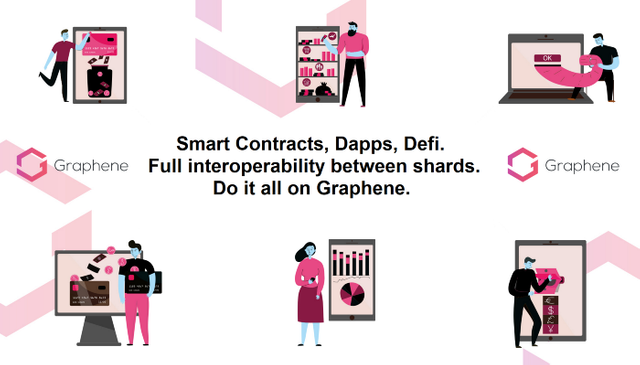Welcome to Graphene!
Graphene - The most advanced & scalable Blockchain in the world!

What is Graphene?
With the potential capacity to process over 100,000 transactions per second, Graphene is a revolutionary Blockchain architecture that makes use of sharding technology and the CASPER consensus protocol. The architecture has been developed using the modern programming language ‘Go’.
Having the ability to support high-performance execution of Turing-complete smart contracts, Graphene can support complex decentralized applications (dApps), business models, and allow the creation of customized shards that are optimized for different use cases, while allowing full interoperability between shards. The potential use cases for Graphene are limitless.

A look at the Technology
Although Graphene is an extremely high-level Blockchain architecture, it is comprised of only a few critical components and can be broken down into such.
The components which make up the Blockchain are; a Beacon Chain, Validator Modules, Shard Modules, Relayer Modules, and Cross-Links.
The Beacon Chain
Handles all of the proof-of-stake and validator registration transactions. This acts as the “main” network chain that links all of the Graphene shards together as one secure, integrated blockchain ecosystem.
Validator Modules
Interact with the beacon module and are what produce blocks for the beacon chain. They also handle the user part of proof-of-stake functions.
There is a system of validator payment rewards and penalties that make up a core part of the enhanced security of the Graphene network. They provide a way for every Graphene user to actively participate in securing the Graphene network and receive payments in return for staking and related services.
Validators run separately from the Graphene wallet, which will allow for secure, decentralized “cold staking” and even staking for balances held in mobile and other light node Graphene wallets.
The Shard Module
Acts as the “executor” for all of the side-chains. It executes the code for the side-chains and keeps them in sync with the beacon chain.
The Relayer Module
The data management portion of the system — keeps track of the entire state of each shard. Relayers package up transactions to be submitted to the network, and advertise these packages to validators. Validators can then ensure that the packages validate without needing to keep track of the entire history of the shard.
This module allows validators to execute transactions without syncing the entire state, which allows for both enhanced security a much better user experience because even full node user wallets will not need to download and validate a copy of the entire blockchain history — syncing wallet balances and transactions will be orders of magnitude faster.
Cross-Links
Are a form of checkpoint that occurs in blocks when there is enough consensus across the Graphene network to finalize the block.
Cross-links are used to finalize transactions that involve more than one shard, so they are used when moving balances from an address on one shard to an address on another shard.
Stay tuned for all Graphene related updates!